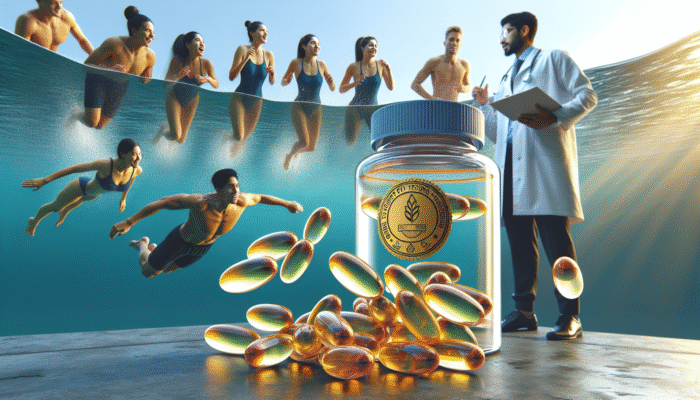Boosting Athletic Performance in Young Swimmers with Omega-3 Fatty Acids
Maximising Endurance and Stamina for a Competitive Advantage
When young swimmers participate in intensive training sessions, achieving peak stamina and endurance is essential for their success in competitive swimming. Adding omega-3 fatty acids to their daily nutrition has been scientifically proven to enhance athletic performance significantly. These vital fatty acids are crucial in the energy production process, enabling emerging athletes to endure prolonged training periods without succumbing to fatigue. Numerous studies have indicated that swimmers who consume sufficient amounts of omega-3 fatty acids consistently display notable improvements in their endurance capabilities, which is vital for both practice sessions and excelling during competitive events.
The beneficial effects of omega-3 on endurance become particularly crucial during long-distance swimming competitions, where each stroke plays a significant role in overall success. Swimmers must cultivate not only their muscular strength but also their cardiovascular endurance to maintain a consistent pace throughout their races. Omega-3 fatty acids enhance oxygen delivery to muscles, allowing young swimmers to sustain high energy levels throughout their training sessions as well as during competitions.
Incorporating omega-3 fatty acids into the daily meals of young swimmers is relatively straightforward. Simple dietary adjustments, like increasing the intake of fatty fish or adding flaxseed to smoothies, can lead to visible improvements in their athletic performance. Coaches and parents are encouraged to motivate young swimmers to make omega-3-rich foods a priority in their pre-competition meals, significantly enhancing their performance potential.
Minimising Inflammation for Improved Recovery Times
The demanding training routines that young swimmers adhere to frequently result in muscle soreness and inflammation. Here, the exceptional anti-inflammatory properties of omega-3 become invaluable assets for these young athletes. Scientific research suggests that omega-3 fatty acids can effectively reduce inflammation, leading to enhanced recovery times following intense training sessions.
As young athletes strive to excel in their swimming performance, they are often at risk of overuse injuries. By incorporating omega-3 fatty acids into their diets, some of these injury risks can be mitigated. By lessening inflammation, young swimmers may experience reduced muscle soreness after workouts, enabling them to recover more efficiently and return to the pool with greater speed.
Parents and coaches play a vital role in ensuring that young swimmers incorporate omega-3-rich foods into their diets. For instance, a delightful salmon dinner or a yogurt bowl topped with flaxseed can be both nutritious and appealing to young palates. By highlighting the recovery and inflammation-reducing benefits that omega-3 provides, young swimmers can better equip themselves to meet the rigorous demands of their training.
Enhancing Cardiovascular Health for Superior Athletic Performance
The heart is an essential organ for any athlete, particularly for young swimmers who rely heavily on cardiovascular endurance. Including omega-3 fatty acids in the dietary plans of young swimmers can significantly strengthen their heart health. Extensive research consistently demonstrates that omega-3 fatty acids contribute to a healthier heart by effectively lowering blood pressure, reducing triglyceride levels, and improving overall cardiovascular function.
For young swimmers, maintaining a well-functioning heart is directly tied to enhanced circulation, which greatly influences their performance. Improved blood flow ensures that muscles receive the essential oxygen they need to perform optimally during both training and competition. Additionally, omega-3 can assist in maintaining a stable heart rate, which is crucial for endurance-focused sports.
Parents can promote heart health by encouraging the inclusion of omega-3-rich foods in the diets of their young swimmers. Creative meal ideas, such as fish tacos or hearty salads topped with walnuts, can transform healthy eating into an enjoyable experience. By recognising the significant advantages of omega-3s on heart health, young swimmers can develop better dietary habits that will support their athletic pursuits.
Identifying Optimal Dietary Sources of Omega-3 Fatty Acids for Young Athletes

Tasty and Nutritious Fatty Fish Options
When considering excellent sources of omega-3, fatty fish take the spotlight. Varieties like salmon, mackerel, and sardines not only offer delightful flavours but are also packed with essential fatty acids. For young swimmers, these fish provide a satisfying meal option loaded with omega-3 fatty acids, making it easier for them to fulfil their daily nutritional needs.
Salmon is particularly noteworthy as a standout among omega-3 sources. A single serving of grilled salmon can significantly enhance a swimmer’s diet. Not only is it incredibly delicious, but it also serves as a versatile ingredient suitable for various dishes, from pasta to salads. Mackerel, often seen as a hidden gem, is rich in omega-3 fatty acids and is also budget-friendly and widely available in many markets around the world.
For young swimmers who might be hesitant to eat fish, a gradual introduction to these flavours can be beneficial. Engaging and fun dishes like fish tacos or sushi rolls can provide enjoyable ways to explore new tastes while simultaneously reaping the health advantages of omega-3. By embracing seafood, young athletes can relish meals that please their taste buds and enhance their swimming performance.
Diverse Plant-Based Sources of Omega-3 Fatty Acids
Not every young swimmer may prefer fish, and that’s perfectly acceptable! For those seeking plant-based sources of omega-3 fatty acids, there are numerous choices available. Flaxseeds, chia seeds, and walnuts are versatile ingredients that can be effortlessly incorporated into a variety of meals. These options are particularly valuable for vegetarian or vegan swimmers aiming to benefit from omega-3.
Flaxseeds are tiny nutritional powerhouses, rich in ALA (alpha-linolenic acid), a form of omega-3. Sprinkling flaxseed on morning oatmeal or blending it into smoothies is a simple way to enhance omega-3 intake. Chia seeds, known for their unique texture, can be added to puddings or mixed into yogurt for a nutritious snack. Walnuts not only add a satisfying crunch but can also enhance salads or trail mix.
Encouraging young swimmers to experiment with these plant-based sources can lead to a well-rounded and nutritious diet. By making subtle modifications to their meals, they can enjoy a diverse array of flavours and textures while ensuring they meet their omega-3 requirements.
Convenient Omega-3 Supplements for Young Swimmers

For some young swimmers, relying exclusively on dietary sources may not sufficiently meet their omega-3 requirements. In such instances, omega-3 supplements can offer a convenient solution to ensure adequate intake. Fish oil capsules are among the most popular options, delivering a concentrated dose of essential fatty acids without the need to consume large amounts of fish.
Parents should consult healthcare professionals before introducing any supplements into their children’s diets. Choosing high-quality products that undergo third-party testing for purity and potency is crucial. This ensures that young swimmers receive the benefits of omega-3 without any unwanted additives or contaminants.
Moreover, plant-based omega-3 supplements derived from algae can serve as excellent alternatives for young swimmers who follow vegetarian or vegan diets. These supplements provide a sustainable option that offers the same benefits as their fish-derived counterparts. Regardless of the source, ensuring that young swimmers receive sufficient omega-3 is vital for their health and athletic performance.
Practical Strategies for Incorporating Omega-3 into a Young Swimmer’s Daily Diet
Intelligent Meal Planning for Omega-3 Integration
Creating meals that seamlessly integrate omega-3 for young swimmers might initially appear challenging, but it can transform into an enjoyable and fulfilling activity. Parents and young swimmers can collaborate to develop a weekly meal plan that incorporates foods rich in omega-3 fatty acids. This approach not only promotes a balanced diet but also encourages young athletes to take ownership of their nutrition.
An effective meal plan could highlight a variety of sources: breakfast might feature a smoothie enriched with chia seeds, lunch could offer a refreshing grilled salmon salad, and dinner might consist of whole-grain pasta tossed with a walnut pesto. By diversifying these options throughout the week, young swimmers can indulge in delicious meals while obtaining the essential nutrients required for excellence in their sport.
Involving young swimmers in the meal preparation process can also ignite their interest in nutrition. They can learn about the health benefits associated with these foods while enjoying quality time in the kitchen. Creating vibrant plates brimming with an assortment of omega-3 sources can be visually appealing and exciting, motivating them to try new dishes.
Nutritious Snack Ideas Packed with Omega-3
Swimmers frequently require snacks that provide the energy necessary for optimal performance and help maintain energy levels throughout the day. Incorporating omega-3-rich foods into young swimmers’ snack options is a smart and effective strategy to achieve this goal. Nutritious snack choices, such as mixed nuts that contain walnuts and almonds, provide a satisfying crunch while delivering essential fatty acids.
Yogurt topped with chia seeds or flaxseed presents another fantastic snack option, combining a creamy texture with the enjoyable crunch of seeds. For a quick grab-and-go solution, energy balls made from dates, oats, and seeds can deliver a wholesome energy boost. These snacks are pivotal in helping young swimmers maintain their omega-3 levels and sustain energy between training sessions.
Parents can also promote variety in snacks to keep things interesting. Preparing different flavours of trail mix, experimenting with nut butters, or creating smoothie bowls can transform snacking into a creative and enjoyable activity. By making nutritious snacking fun, young swimmers are more likely to make healthy choices.
Delicious Recipe Ideas to Enhance Omega-3 Consumption
Cooking can be an exciting and creative way to incorporate omega-3 for young swimmers into daily meals. Simple yet flavourful recipes can help young athletes enjoy the benefits of these essential fatty acids. A classic grilled salmon dish, seasoned with fresh herbs and spices, is not only bursting with flavour but also serves as an outstanding source of omega-3 fatty acids.
Another innovative recipe is a flaxseed smoothie. By blending fruits, spinach, and a tablespoon of flaxseeds, young swimmers can fuel their day with a nutritious boost. For lunch, consider a hearty salad topped with walnuts and a vibrant vinaigrette. These meals not only deliver vital nutrients but are also visually appealing, making healthy eating a more enjoyable experience.
Parents and young swimmers can explore various culinary traditions to discover new and exciting methods to enjoy omega-3-rich foods. From Mediterranean-inspired dishes featuring sardines to Asian recipes that utilise sesame oil high in omega-3, the culinary possibilities are abundant. By experimenting with diverse flavours and ingredients, young swimmers can find their favourites while maintaining a balanced and healthy diet.
Understanding Omega-3 Supplements for Young Swimmers
For young swimmers who struggle to meet their omega-3 needs through diet alone, supplements can be a fantastic alternative. Fish oil capsules or liquid formulations can deliver the necessary omega-3 fatty acids without the hassle of extensive meal preparation. It’s essential to choose high-quality supplements that have undergone thorough testing for purity and safety to ensure their efficacy.
Parents should take their young swimmer’s age and dietary preferences into account when selecting supplements. For those who prefer plant-based options, algal oil can serve as an excellent alternative, providing the same benefits without any fish-derived ingredients.
Incorporating omega-3 supplements into daily routines can be seamless, whether taken with breakfast or as a quick snack. Educating young swimmers about the importance of omega-3 can inspire them to take their supplements consistently, helping them understand how these vital nutrients contribute to their overall health and athletic performance.
Exploring the Multifaceted Benefits of Omega-3 Fatty Acids
Understanding the myriad benefits of omega-3 fatty acids for young swimmers can encourage them to integrate these essential nutrients into their diets. Beyond enhancing athletic performance, omega-3 fatty acids also support overall health, including cognitive function, immune system strength, and joint health.
Research indicates that regular consumption of omega-3 can lead to improved focus, quicker recovery, and reduced inflammation, all critical factors in a swimmer’s training and performance. With these advantages in mind, young swimmers may be more inclined to adopt healthy eating habits and recognise the importance of nutrition in their athletic endeavours.
Parents, coaches, and young athletes can collaborate to create a supportive environment focused on making healthy choices. By prioritising omega-3 in their diets, young swimmers can ensure they are nourishing their bodies appropriately while also promoting long-term health and wellness.
Boosting Cognitive Function with Omega-3 Fatty Acids
Enhancing Focus and Concentration in Competitive Swimming
In the competitive realm of swimming, maintaining focus is of utmost importance. Young swimmers must sustain concentration to execute their strokes and techniques effectively. Integrating omega-3 fatty acids into their diets can profoundly impact cognitive function. Research has demonstrated that omega-3 fatty acids, particularly DHA, are essential for brain health, playing a pivotal role in sustaining focus and alertness.
The fast-paced nature of swimming competitions necessitates that athletes remain mentally sharp. Omega-3 supports the function of neurotransmitters, which are crucial for effective communication between brain cells. This enhanced communication can improve cognitive processing speeds, enabling young swimmers to react quickly and efficiently during races.
Parents can assist their children in maintaining better focus by incorporating omega-3-rich foods into their meals leading up to competitions. A serving of fatty fish or a nutrient-packed omega-3 smoothie can provide the essential nutrients needed to sharpen concentration. By prioritising cognitive health alongside physical training, young swimmers can adopt a holistic approach to their sport.
Improving Memory for Technique Retention
Memory is vital for young swimmers as they learn and apply new techniques and strategies. Including omega-3 for young swimmers can significantly enhance memory function, as research indicates that these fatty acids support neuroplasticity—the brain’s ability to adapt and learn new skills.
Given the constant evolution of swimming techniques and race strategies, young athletes must retain and recall a considerable amount of information to remain competitive. Omega-3 can facilitate this process, making it easier for them to memorise stroke patterns and competitive strategies. This cognitive advantage becomes particularly important during competitions where quick thinking and recall are essential for success.
Parents can foster a conducive learning environment by incorporating omega-3-rich snacks during study sessions or practice. Creative options, such as memory-enhancing smoothies or salads, can be both enjoyable and beneficial. By linking cognitive function to nutrition, young swimmers can better understand how their diet enhances not only their physical performance but also their learning capabilities.
Managing Stress and Anxiety for Optimal Performance
The pressure to perform can become overwhelming for young swimmers, often resulting in increased stress and anxiety. Fortunately, the calming effects of omega-3 for young swimmers can help mitigate these feelings. Research suggests that omega-3 fatty acids can positively influence mood and reduce stress levels, making them a valuable addition to an athlete’s diet.
During competitive situations, young swimmers may experience nerves that can impede their performance. By integrating omega-3 into their daily routine, they may develop greater emotional resilience, allowing them to face challenges with a clearer mindset. This enhanced emotional stability can lead to improved focus and, ultimately, better performance in the water.
Establishing stress-reducing rituals that include omega-3-rich foods can be an enjoyable way for young swimmers to cultivate healthy coping mechanisms. Whether enjoying a comforting dinner of baked mackerel or a soothing chia seed pudding, these meals can contribute to a calming atmosphere. By understanding the connection between diet and mental well-being, young swimmers can strike a balance in their training and competitive experiences.
Strengthening the Immune System with Omega-3 Fatty Acids
Fortifying Immunity for Young Athletes
A robust immune system is crucial for young swimmers, especially those engaged in intense training. Incorporating omega-3 for young swimmers can significantly enhance their immune response, helping them stay healthy and avoid illnesses that could disrupt their training schedules. Research shows that omega-3 fatty acids can boost the activity of immune cells, providing young athletes with a solid defence against infections.
Swimmers are often exposed to various environments, from public pools to dry climates, which increases their susceptibility to illness. By ensuring they receive adequate omega-3, young swimmers can fortify their immune systems, enabling them to focus on training and competition without the fear of falling ill.
Parents can proactively support their children’s immune health by incorporating omega-3-rich foods into their diets. Regularly serving fatty fish or providing omega-3 supplements can help ensure that young swimmers have the essential nutrients necessary to maintain a resilient immune system. This foundational health can significantly influence their ability to maintain an active lifestyle.
Alleviating Allergy Symptoms with Omega-3
For young swimmers, allergies can present significant challenges, often hindering their ability to train consistently and effectively. Fortunately, the anti-inflammatory properties of omega-3 for young swimmers can help alleviate allergy symptoms, allowing athletes to perform at their best. Research indicates that omega-3 fatty acids can modulate the body’s immune response, potentially reducing the severity of allergic reactions.
By incorporating omega-3s into their diets, young swimmers may experience fewer disruptions to their training due to allergy-related issues. Foods rich in omega-3, such as walnuts and flaxseeds, can be seamlessly integrated into snacks and meals, providing a delicious way to combat allergy symptoms.
Parents can collaborate with their young swimmers to identify allergenic foods and find suitable replacements that are rich in omega-3 fatty acids. This not only supports their health but also fosters a positive relationship with food and nutrition.
Accelerating Recovery from Illness with Omega-3
When illness strikes, young swimmers require swift recovery to maintain their training schedules. Omega-3 can significantly aid in hastening recovery from minor illnesses, enabling young athletes to return to the pool more quickly. Research indicates that omega-3 fatty acids can help reduce inflammation and support the body’s overall recovery processes.
Young swimmers should be encouraged to consume omega-3-rich foods during their recovery periods. This can include meals featuring fatty fish or plant-based options, such as chia seed pudding. By prioritising nutrition during these times, young athletes can optimise their recovery and quickly return to their beloved activities, such as swimming.
Involving young swimmers in their recovery plans can foster a sense of responsibility for their health. Educators, parents, or coaches can guide them in understanding how nutrition impacts their healing process, helping to instil lifelong healthy habits.
Supporting Respiratory Health with Omega-3 Fatty Acids
The significance of maintaining optimal lung function cannot be overstated for young swimmers. Integrating omega-3 fatty acids into the diet of young swimmers can enhance lung function and alleviate respiratory issues, which is especially beneficial for athletes who require efficient breathing during training and competitions. Studies have suggested that omega-3 fatty acids can help reduce the severity of asthma and other respiratory conditions.
Young swimmers facing respiratory challenges may find relief through a diet rich in omega-3 fatty acids. Foods such as fatty fish and flaxseed can promote better lung health, enabling athletes to breathe more easily while swimming.
Parents can encourage young swimmers to prioritise their respiratory health by incorporating omega-3-rich foods into their daily meals. This proactive approach not only supports their swimming performance but also contributes to overall well-being. By fostering an understanding of the relationship between nutrition and respiratory health, young swimmers can take charge of their health journey.
Enhancing Immune Cell Function with Omega-3 Fatty Acids
A well-functioning immune system is essential for any athlete, and omega-3s can improve the activity of immune cells in young swimmers, providing a robust defence against infections. Research shows that omega-3 fatty acids can help regulate immune responses, resulting in better health outcomes for athletes.
Young swimmers are particularly vulnerable to exposure to various pathogens, especially in communal pool environments. Ensuring adequate intake of omega-3 can help parents support their children in developing a stronger immune response, enabling them to remain healthy and focused on their training.
Engaging young swimmers in discussions about nutrition and immune health can empower them to make informed choices. By incorporating omega-3-rich foods into their meals, they can actively support their immune systems, fostering a positive mindset towards their health and overall well-being.
Promoting Joint Health through Omega-3 Fatty Acids
Lubricating Joints for Enhanced Mobility in Young Swimmers
Young swimmers often perform repetitive movements that can place strain on their joints over time. One of the key benefits of omega-3 for young swimmers is its ability to lubricate joints, effectively reducing friction and wear. Research has indicated that omega-3 fatty acids can contribute to maintaining joint health, which leads to improved mobility and comfort in the water.
When young swimmers consume foods rich in omega-3, they supply their bodies with the essential nutrients necessary for optimal joint function. This lubrication becomes particularly advantageous during intense training sessions, allowing swimmers to perform at their best without discomfort.
Parents can encourage young athletes to include omega-3s in their diets by offering meals that feature fatty fish, nuts, or seeds. By highlighting the importance of joint health, young swimmers can better appreciate the role of nutrition in supporting their physical activities.
Preventing Injuries through Omega-3 Intake
Injuries can sideline young athletes and disrupt their training routines. Fortunately, incorporating omega-3 for young swimmers can contribute to injury prevention by enhancing overall joint health. Research suggests that omega-3 fatty acids reduce inflammation, thereby decreasing the likelihood of overuse injuries that are common among swimmers.
By promoting healthy joints, young swimmers can enjoy longer training sessions and improved performance outcomes. Parents can play a critical role in this by ensuring their children have consistent access to omega-3-rich foods, enabling them to maintain joint health and enhance their swimming experience.
Creating an environment where young swimmers prioritise injury prevention is essential. By understanding how nutrition can support their performance, they can develop healthy habits that extend beyond the pool.
Enhancing Flexibility Through Proper Nutrition
While the description didn’t specifically address flexibility, it is important to acknowledge its significance for young swimmers. Flexibility can greatly influence performance and overall movement in the pool. While omega-3 for young swimmers primarily focuses on joint health, it also indirectly supports flexibility by ensuring that joints remain well-lubricated and free from stiffness.
By reducing inflammation, omega-3s can facilitate smoother movement, enhancing a swimmer’s range of motion. Young athletes who prioritise flexibility through stretching and a balanced diet can experience improvements in their strokes and overall performance.
Encouraging a holistic approach to flexibility, which includes proper nutrition and conditioning, can lead to better outcomes for young swimmers. By incorporating omega-3-rich foods into their diets, they can support their overall health and performance in the water.
Answers to Common Questions About Omega-3 Fatty Acids
What are omega-3 fatty acids?
Omega-3 fatty acids are essential fats that the body cannot produce independently. They are crucial for numerous bodily functions, including heart health, brain function, and inflammation reduction.
How do omega-3 fatty acids specifically benefit young swimmers?
Omega-3 fatty acids enhance endurance, reduce inflammation, support heart health, and improve cognitive function, making them vital for the performance and overall well-being of young swimmers.
What are some dietary sources that are rich in omega-3 fatty acids?
Dietary sources of omega-3 include fatty fish (such as salmon and mackerel), plant-based options (like flaxseeds and walnuts), and omega-3 supplements, such as fish oil capsules.
Can young swimmers safely take omega-3 supplements?
Yes, omega-3 supplements can be a convenient option for young swimmers, especially if they struggle to obtain enough omega-3 from their diets. It is advisable to consult a healthcare professional before starting any supplements.
How can I effectively incorporate omega-3 into my child’s diet?
Integrate omega-3-rich foods into daily meals using recipes that feature fatty fish, adding seeds to smoothies, and serving nut-based snacks to provide essential nutrients.
How do omega-3s positively influence cognitive function?
Omega-3 fatty acids, particularly DHA, enhance brain health by improving memory, focus, and mood, which can significantly benefit young swimmers during training and competitions.
Are there viable plant-based omega-3 options available?
Yes, plant-based sources of omega-3 include flaxseeds, chia seeds, walnuts, and algal oil supplements, making them suitable for young swimmers who are vegetarian or vegan.
How do omega-3s contribute to joint health?
Omega-3s lubricate joints, reduce inflammation, and help prevent injuries, allowing young swimmers to maintain better mobility and comfort during training.
Can omega-3 fatty acids assist with recovery from minor illnesses?
Yes, omega-3 fatty acids can support faster recovery from minor illnesses by decreasing inflammation and enhancing immune function, helping young swimmers return to training more rapidly.
Should young swimmers consume fish regularly?
Incorporating fish into their diets regularly can provide young swimmers with a rich source of omega-3 fatty acids, significantly contributing to their overall health and athletic performance.
Connect with us on Facebook!
The Article Omega-3 for Young Swimmers: Essential Benefits appeared first on https://athleticsupplement.com
The Article Omega-3 Benefits for Young Swimmers: Why It Matters Was Found On https://limitsofstrategy.com



